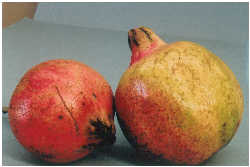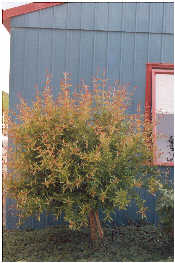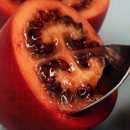Pomegranate |
Punica Granatum |
| |
||
 |
||
 |
||
 |
||
This stunning ornamental plant originating from the Middle East and Asia and has had a long association with humans. For more than 2000 years. It has been widely recorded throughout history and only the fig is mentioned as much in mythical and biblical writings.
Landscape Value
Great in containers or as a specimen in the garden why not be different, try as an espalier.
Nutritional Value
Reasonable levels of vitamin C, K and B6, good levels of potassium, copper, pantothenic acid, ellagic acid and flavonoids.
How to Eat
Delicious in cool drinks, jellies, sauces, salads and sweet and sour cooking.
Expected Yield
Once mature the tree will produce 15-30kgs.
Generic Fruiting Time
| J | F | M | A | M | J | J | A | S | O | N | D |
Growing
Sun
Needs hot summers to produce the best fruit.
Wind
Provide a warm sheltered site to enhance fruit quality.
Climate
The Pomegranate thrives in hot dry summers but requires moisture during fruiting stage from late summer to late autumn. Is frost tolerant as it is deciduous.
Soil
Will tolerate most soil conditions providing it is well drained.
Fertiliser
Young trees need regular irrigation and general fertiliser with extra nitrogen. Once established they need little or no extra nutrients but will appreciate, a good mulch around the roots.
Pruning
Lightly prune after fruiting, to a desired shape this will encourage new growth. Fruits on new season wood.
Pests
General pest and disease free but minor problems are leaf and fruit spot.
Hardiness
-10 °C
Special Conditions


